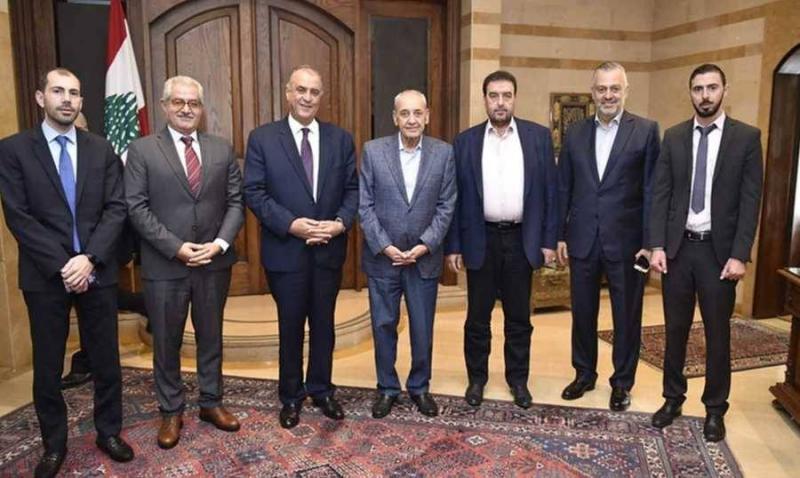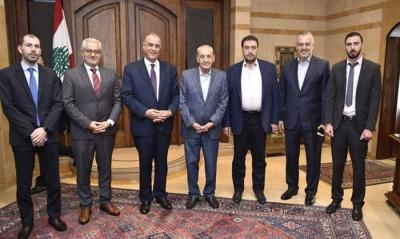The "National Moderation" bloc was surprised to find that the positive reactions to its initiative to resolve the presidential impasse by electing a president did not suggest a politically clear path for such an election, despite the media welcome it received from most parliamentary blocs that expressed readiness to participate in the consultative meeting it called for to agree on a roadmap to end the presidential vacancy, according to reports in "Asharq Al-Awsat."
Regardless of the discussions that took place between the Moderation bloc and other parliamentary blocs to secure the necessary quorum for the consultative meeting, the approach of the opposition forces, except for the Phalange Party, to participate in the consultative meeting alongside the Democratic Gathering bloc, caused embarrassment for the parliamentary blocs aligned with the resistance axis. These blocs had bet that the refusal would come from the opposition, thus sparing them from embarrassment. However, the resistance axis miscalculated the opposition's stance, forcing it to directly intervene to disrupt the consultative initiative and avoid engaging in it, to block the possibility of reaching a consensus on a third presidential candidate by excluding former Deputy Sleiman Franjieh, head of the Marada Movement, and his competitor, former Minister Jihad Azour, from the presidential race. This was intended to create space for agreement on a candidate who is equally distanced from both the resistance axis and the opposition, and possesses the specifications set by the quintet committee.
In this context, "Asharq Al-Awsat" learned from political sources that the meeting between the Moderation bloc and the Loyalty to the Resistance bloc, which speaks on behalf of Hezbollah, did not achieve any progress and ended as it began. This is because the party has a set of concerns and needs more time before it decides whether to engage in consultations to end the vacancy in the presidency.
Parliamentary sources revealed that Hezbollah maintains its position of supporting Franjieh’s candidacy and is not inclined to abandon this support in favor of seeking a consensus president categorized under the third presidential option. They stated that this option would make the party anxious and hesitant to clarify its stance, noting that it will not change its presidential choices to prevent the election of a president who does not provide protection for the resistance nor betrays it, which are specifications that the future president should possess.
The sources pointed out that the party's reluctance to clarify its position is not without reason, as it aligns to a considerable extent with the hesitation of the Marada Movement bloc and the National Accord bloc, which includes MPs Faisal Karami, Taha Nagy, Adnan Tarablousi, Hassan Mourad, and Mohammad Yahya.
The sources wondered about the reasons behind the hesitance of both the Marada and National Accord blocs in determining their positions on the call for a consultative meeting, questioning whether their caution is directly related to the rumor that they do not wish to rush the stages and prefer to wait for Hezbollah's signal after the conclusion of its meetings with parliamentary blocs.
There were also inquiries about whether the party, through its parliamentary bloc, aimed to express its concerns to obstruct the preference for the third presidential option supported by the quintet committee, which includes representatives from the United States, France, Saudi Arabia, Egypt, and Qatar.
Moreover, the increasing anxiety within the party is due to the fact that the Moderation bloc's movement, as indicated by several of its MPs, receives full support from the quintet, which blesses any Lebanese movement aimed at facilitating the election of a president, as the quintet constitutes a support group for efforts aimed at breaking the presidential deadlock.
It has been suggested that the Moderation bloc’s openness to the quintet worries the party in light of the support it has received from them, following meetings with ambassadors from Saudi Arabia, Egypt, France, and a political adviser from the US Embassy, who reportedly preferred to listen to their views without clarifying a position on their initiative to hold a consultative meeting under the parliament’s dome.
It has also been indicated that the party is already preparing for the stance that the MPs situated between the resistance axis and the opposition may take, especially those belonging to the "Moderation" bloc, who will not support any presidential candidate lacking Arab backing that would reintegrate Lebanon into its Arab surroundings and into the international community's priorities.
Therefore, the party does not show enthusiasm for participating in the consultative meeting as long as it has not yet succeeded, according to parliamentary sources, in garnering more supporters for Franjieh, allowing for the withdrawal of the third presidential option from discussions, which could dominate the agenda of the meeting if it is determined to take place.
The party's commitment to supporting Franjieh is natural, and it is unlikely to change its position in the foreseeable future, as it prefers to leave the presidential card with Iran, hoping it would leverage it to improve its negotiating conditions with the U.S. However, parliamentary sources view the Moderation bloc's initiative as one where no one sells their position for free, and that the MPs' support for the initiative reflects their desire to absolve themselves from obstruction, and nothing more.
The remaining question is whether the Moderation bloc’s initiative comes as a means to fill the void during a waiting period, especially if the consultative meeting, whose fate is pending, gets momentum from their meeting tomorrow (Saturday) with Speaker Nabih Berri to brief him on their findings from parliamentary discussions promoting their initiative, especially at a time when it seems that the moment to include the election of a president in the local voters’ agenda has not yet arrived, pending the quintet’s resumption of efforts to place the presidential election on a fierce boil, contingent on MPs responding to international calls to elect a president sooner rather than later, as their cooperation would encourage major regional or international voters to provide assistance in closing the chapter on the presidential vacuum.




